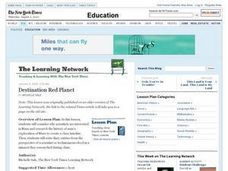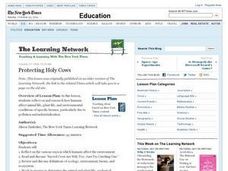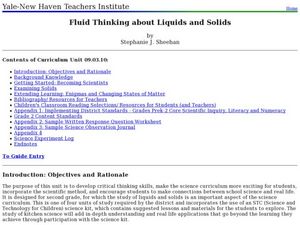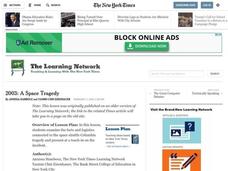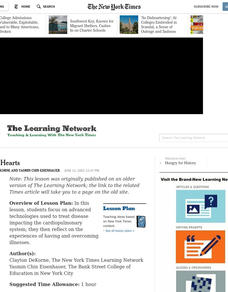Curated OER
Destination Red Planet
Young scholars explore reasons why people are interested in exploring other planets. After reading an article, they identify developments in the mission to Mars. Using the internet, they research the history of exploring Mars and...
Curated OER
Protecting Holy Cows
Students study the interrelationships of organisms and their environments. They study ecological communities and determine what is necessary for survival. Students discuss and answer questions concerning a group's biome, habitat, food...
Curated OER
Bugging Out
Students explore how insects behave in their natural habitats and build dioramas to create an Insect World in their classroom. They investigate various insects and the roles they play in the environment. They write creative short...
Curated OER
Finding Balance
Young scholars examine the relationships between force, mass and balance through the lens of clay sculpture. They discuss the definitions and concepts behind Newton's Third Law of motion then individually apply these principles to the...
Curated OER
Combating Corrosion
Students perform an experiment to show the chemical reactions that occur when metal corrodes. They apply the results of the experiment to the conservation efforts of art curators trying to restore an ancient Greek bronze. This lesson...
Curated OER
Freddie Feels
Students become aware of the sense of touch and the body parts effected by touching. In this five senses instructional activity, students touch mystery items and create a touch page. Students discuss the body parts connected...
Curated OER
Observing Trees
Students create a timeline of a tree in a given time span. In this life cycle lesson, students observe one particular tree at the beginning of the year, and continue their observations for several weeks to create a timeline of the...
Curated OER
Going Local with Global Warming
Students examine climate change by using recent temperature records. In this data analysis lesson students plot weather data and study the differences between weather and climate.
Curated OER
Fluid Thinking About Liquids and Solids
Second graders examine the physical characteristics of the different states of matter. In this chemistry lesson, 2nd graders observe how matter changes from one phase to another. They classify substances according to its type of matter.
Curated OER
2003: A Space Tragedy
Students examine the facts and logistics connected to the space shuttle Columbia tragedy and present at a teach-in on the incident. February 3, 2003)
Curated OER
Thirsty for Drought Relief
Students research a variety of drought-related concerns, acting as part of a 'drought preparedness taskforce.' They propose next steps for the government to take in case of drought and assess the viability of these proposals.
Curated OER
Mining Riches
Students research and map how various mining ventures have changed local geographies and populations. First they read the article provided--Examining the Environmental and Social Impact of the Mining Industry.
Curated OER
Deep Thoughts
Students examine what lies within the Earth. They research and create scale models illustrating the layers of the Earth and write skits advocating a travel plan to send a probe into the Earth's mantle.
Curated OER
Healthy Hearts
Students focus on advanced technologies used to treat disease impacting the cardiopulmonary system; they then reflect on the experiences of having and overcoming illnesses.
Curated OER
Technically Speaking
Young scholars research how various forms of technology have changed during different time periods and the ways in which technology impacts society. They propose designs for galleries within a technology museum.
Curated OER
Growing Pains
Learners compare common food items with the parts of a plant. They grow their own plants to assess the difficulties in assisting a plant's growth and reproduction.
Other popular searches
- Elementary Science Journals
- Science Journals Set Up
- Making Science Journals
- Science Journals Rocks
- Space Science Journals
- Creating Science Journals
- Science Journals Trees
- Reasons for Science Journals
